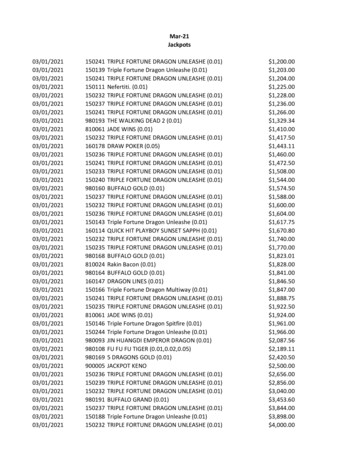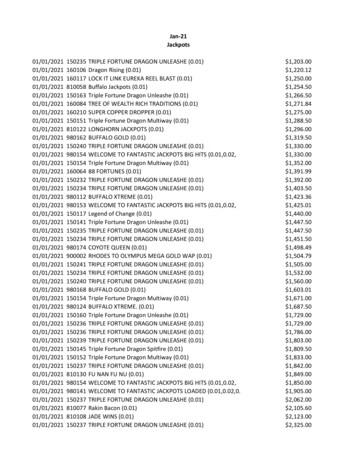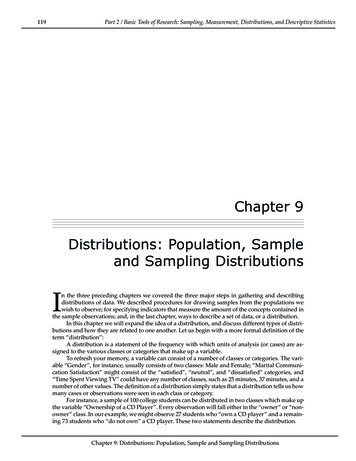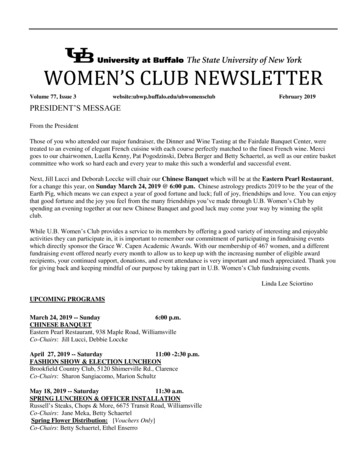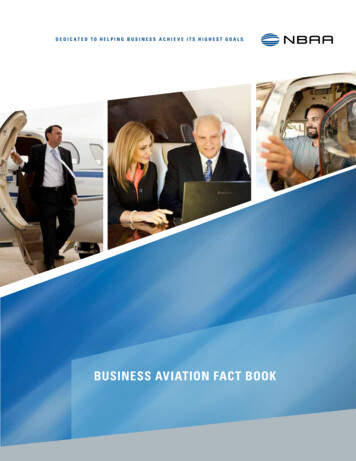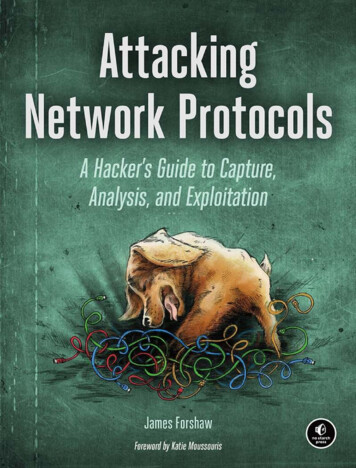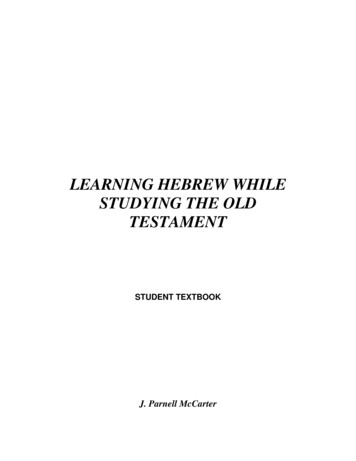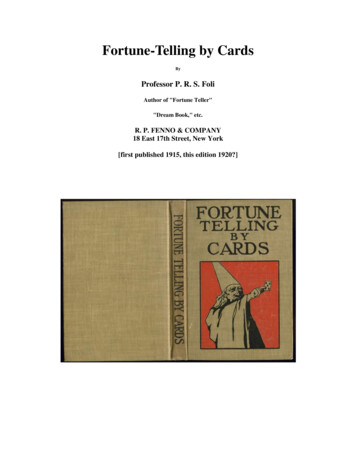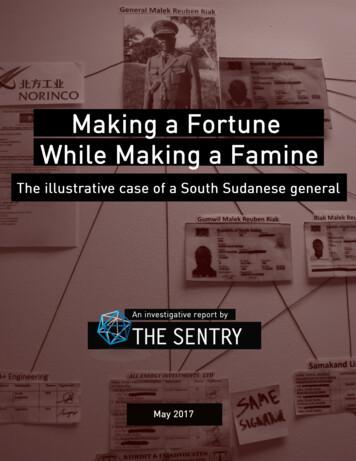
Transcription
Making a Fortune While Making a FamineThe illustrative case of a South Sudanese generalMay 2017The Sentry is an initiative of the Enough Project and Not On OurWatch (NOOW), with investigative support from the Center forAdvanced Defense Studies (C4ADS).Photo Credit: The Sentry1The Sentry TheSentry.orgMaking a Fortune While Making a Famine: The illustrative case of a South Sudanese generalMay 2017
While South Sudanese people are starving by the tens of thousands and war rages on, a smallgroup of senior military officers have gotten rich. This brief from The Sentry presents the caseof one influential general whose military strategies helped create the famine. This general’scase illustrates how the deliberate absence of the rule of law provides the potential forimmense financial benefits for the leaders of South Sudan’s regime and how current incentivesfavor extreme violence and grand corruption over peace and good governance.A recent U.N.-declared famine in South Sudan’s Unity state has left 100,000 people atimmediate risk of dying of starvation.1 All told, an estimated 7.5 million people in SouthSudan—more than half the country’s population—urgently need assistance.2 The cause ofthis famine is not a mystery. Government and rebel forces have used specific tactics toproduce mass displacement and famine in South Sudan, particularly through the massivecattle raids undertaken by government-backed forces, attacks on agricultural areas, and theseeding of intercommunal violence beyond clashes between government forces and armedopposition groups.3The names of the men who are responsible for planning and executing a brutal militarycampaign in Unity state in 2015—an offensive that laid the groundwork for the outbreak of thefamine—are not secret. According to the U.N. Panel of Experts on South Sudan, the offensivewas planned and executed by a group of senior military officials who were close to SouthSudanese President Salva Kiir.4 Furthermore, while much of the country starves, some ofthese same military officers appear to have been getting rich. They profit from insider deals,move their fortunes through large international banks, and often use their children to keeptheir names off of company records. Many of these senior officials do not appear to concealtheir fortunes from other insiders, as they often do business together and own homes close toone another outside South Sudan.5Lt. Gen. Malek Reuben Riak is one of the senior generals that the U.N. panel has identifiedas responsible for the violence in Unity state that directly led to the famine. A closeexamination of his business activities helps illustrate the warped incentives that motivatesenior military officials in South Sudan. Looking at this illustrative example of just a slice ofcorrupt economic activity by just one of the leading generals demonstrates how deeply theincentives favor violence and instability over peace and democratic governance.Lt. Gen. Reuben Riak was promoted by President Kiir to Deputy Chief of Staff of the SudanPeople’s Liberation Army (SPLA) in January 2013. Lt. Gen. Reuben Riak held that position—which involved a central role in weapons procurement for the national army—for the firstseveral years of the civil war, until March 2016, when he became Deputy Chief of Staff of theSPLA for Training. On May 24, 2017, President Salva Kiir promoted Lt. Gen. Reuben Riak toDeputy Chief of Defense Staff and Inspector General of the army. According to South Sudan’snational budget, in 2014 and 2015, the salary for a general of this rank was approximately 40,000 per year, including a housing stipend.62The Sentry TheSentry.orgMaking a Fortune While Making a Famine: The illustrative case of a South Sudanese generalMay 2017
Lt. Gen. Reuben Riak has held different positions in logistics, procurement, and training for the SPLA. In May 2017,President Kiir promoted him to Deputy Chief of Defense Staff and Inspector General of the army.But procuring weapons and planning brutal military offensives are only Lt. Gen. Reuben Riak’sday job.As reported in War Crimes Shouldn’t Pay in September 2016, The Sentry has documents thatshow 3.03 million moving through Lt. Gen. Reuben Riak’s personal bank account—a U.S.dollar-denominated account at Kenya Commercial Bank (KCB)—between January 2012 andearly 2016. Financial transactions reviewed by The Sentry and discussed in its September2016 report showed millions of dollars passing through Lt. Gen. Reuben Riak’s personal bankaccount at KCB, including more than 700,000 in cash deposits and large payments fromseveral international construction companies operating in South Sudan. These paymentscame from companies backed by Chinese, Lebanese, and Turkish investors. These includehundreds of thousands of dollars in payments and cash deposits into the account since thewar in South Sudan began in December 2013. In that same period, over 1.16 million waswithdrawn from Lt. Gen. Reuben Riak's account, in his own name or as “cash.” Lt. Gen.Reuben Riak also has acquired stakes in numerous companies incorporated in South Sudan,including engineering and energy companies.7Information provided to The Sentry after publication of its September 2016 report providesmore clarity about the nature and extent of Lt. Gen. Reuben Riak’s business operations inSouth Sudan and his links with multinational corporations, banks, and foreign politicians. Thisreport uses this new information to take a closer look at Lt. Gen. Reuben Riak’s business3The Sentry TheSentry.orgMaking a Fortune While Making a Famine: The illustrative case of a South Sudanese generalMay 2017
activities. One important finding is that Lt. Gen. Reuben Riak controls a private business calledMak International Services that sells explosives to private companies operating in SouthSudan—an arrangement that has been not only endorsed but also promoted on an exclusivebasis by the military in which he holds a key leadership role. 8 According to other documentsreviewed by The Sentry, Lt. Gen Reuben Riak also sits, along with several other seniorgenerals, on the board of a holding company that has joint ventures with foreign investors andappears to be active in South Sudan’s mining and construction sectors.9 This Sentry reportalso reviews documents detailing how Lt. Gen. Reuben Riak’s family members appear to berepresenting his interests on several commercial ventures, often alongside the familymembers of other senior government officials in South Sudan.10 This report also examinesdocuments that purport to show that Lt. Gen. Reuben Riak and members of his family jointlyown businesses with members of the political elite in neighboring Ethiopia, Kenya, andUganda.The case of Lt. Gen. Reuben Riak illustrates a broader pattern in South Sudan in whichpowerful officials work closely together in a relatively small network and preside over thecountry’s violent kleptocratic system of government. They get rich while the rest of the countrysuffers the consequences of a brutal civil war and a horrific famine. Their business interestsoften intersect with one another and with those of officials in neighboring countries,undermining the credibility of diplomatic processes designed to promote peace and possiblycompromising those involved in negotiations. Protecting this network’s position in powermeans continued access to rent-seeking opportunities as well as continued impunity forcorruption and involvement in human rights abuses.The case of Lt. Gen Reuben Riak does not just support the case that top South Sudaneseofficials are getting rich off of conflict. The case also illustrates the significant untappedleverage held by the international community vis-à-vis these officials. Documents reviewed byThe Sentry indicate that Lt. Gen. Reuben Riak has used international banks to move millionsof U.S. dollars and he conducts business with international investors.11 Foreigngovernments—especially the U.S. government—are in a position to curb his ability to accessthe international financial system. This is because virtually all transactions that are conductedin U.S. dollars pass through the U.S. financial system, even if only for a split second. As aresult, the U.S. government has jurisdiction over these financial flows and, in turn, the abilityto scrutinize and stop them. This report concludes by presenting how the U.S. and othergovernments can more effectively use the tools of financial pressure—namely sanctions andanti-money laundering provisions—to impose steep consequences on the top officials whoare responsible for South Sudan’s horrific civil war and resultant famine. In this case, theUnited States should impose network sanctions (i.e., asset freezes targeting a network ofindividuals and entities, rather than a single person) on Lt. Gen. Reuben Riak and thecompanies he owns or controls.4The Sentry TheSentry.orgMaking a Fortune While Making a Famine: The illustrative case of a South Sudanese generalMay 2017
Explosive ArrangementTwo companies named in War Crimes Shouldn’t Pay as having made payments to Lt. Gen.Reuben Riak—China Wu Yi and China New Era—approached The Sentry following thereport’s publication to provide additional details about the nature of their relationship with Lt.Gen. Reuben Riak. Both companies told The Sentry in writing that the funds deposited intoLt. Gen. Reuben Riak’s personal bank account at KCB were payments for explosives eachcompany acquired from Mak International Services, a South Sudanese firm controlled by Lt.Gen. Reuben Riak. China New Era declined to answer any additional questions posed by TheSentry. China Wu Yi provided additional information about the nature of its relationship withMak International and, by extension, Lt. Gen. Reuben Riak.12In a letter to The Sentry, China Wu Yi stated that its business relationship with MakInternational began in 2013, shortly after it had acquired a license to open a quarry and stonecrushing operation in Central Equatoria state.13 According to the company, sourcing theexplosives needed to carry out its business operations required approval from the SudanPeople’s Liberation Army (SPLA) Engineering Corps. The SPLA Engineering Corps, in turn,directed the buyer to purchase its explosives from Mak International, which China Wu Yi statedwas the only supplier of explosives.14 Between April 9, 2013 and September 29, 2014, ChinaWu Yi made eight payments amounting to 131,686 for explosives sourced from MakInternational. According to records provided by China Wu Yi, the company received 940 bagsof ammonium nitrate (25 kilograms each), 75 packages of “Super Power” (25mm each), 36rolls of cortex (250m each), and 26 electronic detonators. According to China Wu Yi, thecompany’s primary points of contact at Mak International were “Malok Reuben” and “AyomReuben.”15 China Wu Yi was instructed to make payments to Malek Reuben Riak. Six of ChinaWu Yi’s eight payments for explosives sourced from Mak International—a total of 116,166—were checks made out to Lt. Gen. Reuben Riak and deposited into his personal bank accountat KCB. According to the company, it also made two cash payments to Mak International,totaling 13,520.16In short, these documents show an SPLA office that at one point employed Lt. Gen. ReubenRiak requiring companies that need explosives for commercial business in South Sudan toobtain them solely from a private company controlled by Lt. Gen. Reuben Riak, who remainsa senior military officer. Furthermore, the apparent ultimate beneficiary of these transactions,Lt. Gen. Reuben Riak, is not only a senior military official but also a former employee of theSPLA Engineering Corps, the entity that oversees the approval process.There are important questions about the legality of Lt. Gen. Reuben Riak’s involvement withMak International. Specifically, the 2009 SPLA Act prohibits corrupt practices by all SPLApersonnel and makes such activities subject to imprisonment.17 More broadly, the SouthSudanese constitution also addresses the issue of specific officials engaging in businessactivities outside of government while they are in office, though there can be challenges withestablishing the applicability of the terms of the particular provisions to individual cases.5The Sentry TheSentry.orgMaking a Fortune While Making a Famine: The illustrative case of a South Sudanese generalMay 2017
China Wu Yi Co. Ltd.’s request for explosives to the SPLA Engineering Corps. Top Right: China Wu Yi Co. Ltd.’sinvoice for the purchase of explosives, also signed by Ayom Ruben. Bottom: Copy of a check from China Wu Yi Co.Ltd. to Malek Reuben Riak.6The Sentry TheSentry.orgMaking a Fortune While Making a Famine: The illustrative case of a South Sudanese generalMay 2017
Bright Star InternationalLt. Gen. Reuben Riak has also been a member of the board of directors of a South Sudanregistered company called Bright Star International, according to documents obtained by TheSentry. The other members of the board of directors listed on one document—Lt. Gen. OyayDeng Ajak, Maj. Gen. Bior Ajang Duot, Gen. James Hoth Mai, Gen. Pieng Deng Kuol, and Lt.Gen. Salva Mathok Gengdit—are also senior generals in South Sudan’s military. Several ofthem were deputy chiefs of staff of the SPLA at the time of Bright Star International’s formation.The same document authorizes another senior general, Lt. Gen. Malual Ayom Dor, to operateon behalf of the company.18Documents reviewed by The Sentry indicate that Bright Star International, in turn, has severaljoint ventures with foreign investors that have reportedly been involved in mining in SouthSudan. Corporate records show that Bright Star joined with a group of Ethiopian investors toform Liberty Construction JV Limited on November 24, 2010.19 Notably, these documents statethat Bright Star International’s partners in the joint venture include Akiko Seyoum Ambaye—a cousin of the widow of late Ethiopian Prime Minister Meles Zenawi—and an Ethiopianbusinessman named Alemayehu Ketema Woldetsadik.20 According to a 2013 report by theU.S. Institute of Peace, Liberty Construction was involved in cement production as well asmarble and limestone mining in Eastern Equatoria state.21 Bright Star International has alsoreportedly held a 35 percent stake in another South Sudan-registered mining company calledSky Minerals Co. Ltd., with the remaining shares held by a group of investors from SouthSudan and South Africa. According to documents obtained by The Sentry, Sky Minerals wasformed on July 3, 2013 “to carry out sustainable development in gold and other mineralsmining industries in South Sudan” and also is purportedly involved in the trade in “preciousstones like gold, silver, diamonds, bronze, [and] other minerals.”22The Bright Star International documents indicate that a group of senior South Sudanesegenerals have formed a series of corporate entities with foreign investors that appear to beinvolved in mining and construction. While it is possible that this firm may be a military-ownedenterprise, none of the documents reviewed by The Sentry pertaining to Bright StarInternational suggest that the government of South Sudan owns any stake in the company. Itdoes not appear that any information has been released about Bright Star International or itsactivities by South Sudan’s military. Nor is The Sentry aware of any public release ofinformation pertaining to the mining activities of Bright Star’s joint ventures with foreigncompanies, despite the fact that mining permits are supposed to be granted throughtransparent public tendering processes.7The Sentry TheSentry.orgMaking a Fortune While Making a Famine: The illustrative case of a South Sudanese generalMay 2017
An October 20, 2010 resolution by the Board of Directors of Bright Star International Corporation Limited providesGen. Malual Ayom with “special power of attorney” and authorizes him to form a joint venture with Double “A”Construction (SS) Co. Ltd. The document is signed by Oyay Deng Ajak, Bior Ajang Duot, James Hoth Mai, Pieng DengKuol, Malek Reuben Riak, and Salva Mathok Gengdit.If Bright Star International is, in fact, a publicly-owned entity, it is important for its finances tobe subject to public scrutiny. Nile Petroleum Corporation (Nilepet)—South Sudan’s nationaloil company and largest state-owned enterprise—is a case in point. According to the U.N.Panel of Experts on South Sudan, Nilepet has been used during the current civil war as a fundthat has enabled President Kiir and his inner circle to circumvent normal protocols for militaryspending.23 According to the Natural Resource Governance Institute, Nilepet “has yet torelease any information on its activities, even though the Petroleum Law states thatcomprehensive, audited reports on the company’s finances must be publicly available.”24Elsewhere, there are numerous examples of how state-owned companies can be used tomisappropriate funds. State-owned companies involved in the natural resource sectorelsewhere around the world—Gecamines in the Democratic Republic of Congo, Sonangol inAngola, Sinopec in China, and many more—have reportedly been involved in large-scalepublic corruption scandals in significant ways.25 For this reason, it is important for the detailsabout Bright Star International’s activities and business engagements to be disclosed to thepublic. If Bright Star International is a private business, however, then there are seriousquestions about how a group of senior generals have been able to work with foreign investorsto gain access to South Sudan’s mineral rights with very little public disclosure.8The Sentry TheSentry.orgMaking a Fortune While Making a Famine: The illustrative case of a South Sudanese generalMay 2017
Family Business or Masked Ownership?The explosives business is just one of many commercial enterprises in Lt. Gen. Reuben Riak’sbusiness portfolio. As reported by The Sentry in September 2016, corporate records indicatethat Lt. Gen. Reuben Riak and his immediate family hold stakes in numerous businessesregistered in South Sudan, including companies that purport to be involved in mining,engineering, and energy.First, documents reviewed by The Sentry suggest that Lt. Gen. Reuben Riak has engaged inbusiness deals with a political insider in neighboring Uganda, a country in which Lt. Gen.Reuben Riak has maintained a home. A document dated March 25, 2013 and signed by MalekReuben Riak states that he held a 40 percent stake in South Sudan-registered GMCConstruction Ltd. The remaining 60 percent of the company’s shares were divided evenlybetween two Ugandan citizens: Geoffrey Kamuntu and Chris Akansasibwa Rugari.26 GeoffreyKumuntu is also the name of the son-in-law of Ugandan President Yoweri Museveni. Mr.Kamuntu was named in news reports concerning a political scandal in Uganda in whichFrancis Atugonza, a prominent member of the opposition party in Uganda, claimed that hehad been offered 1.5 billion Ugandan shillings ( 630,000) to pull out of national elections.According to Reuters, Atugonza said Mr. Kamuntu called him to tell him that PresidentMuseveni would “do anything” in order to persuade him to switch his allegiance to the rulingparty. Representatives for President Museveni’s party denied the accusations.27Second, corporate records obtained by The Sentry following the publication of War CrimesShouldn’t Pay appear to show that the investment portfolios of several of Lt. Gen. ReubenRiak’s children also reflect overlapping business interests with the families of other top SouthSudanese officials. For example, documents show that Lt. Gen. Reuben Riak’s daughter,Christine Malek Reuben, has held a 20 percent stake in Euro-Afro Trade and Consult Ltd.alongside Anok Kiir (the daughter of the president) and an Egyptian businessman. 28 Anotherdocument lists Christine Malek Reuben as a shareholder in Jubilee Bank, alongside Gen.James Hoth Mai’s daughter, Titchiang Hoth Mai, who was only 15 years old at the time of thebank’s incorporation.29Third, there are at least some indications that the family members of these senior generalsmay be operating on behalf of the generals themselves. For example, neither the signature ofTitchiang Hoth Mai nor that of Christine Malek Reuben appears on corporate documents forJubilee Bank. Instead, next to their names are what appear, based on comparisons with otherdocuments reviewed by The Sentry, to be the signatures of their fathers, Lt. Gen. ReubenRiak and Gen. Hoth Mai.30 Similarly, corporate filings indicate that a person named “EmmanuelGum Malek” owns a 50 percent stake in a company called Eastern Mountain Ltd. alongside aKenyan citizen named Nelly Akal Abonyo. However, next to Emmanuel Gum Malek’s name iswhat appears, based on comparisons with other documents reviewed by The Sentry, to be Lt.Gen. Reuben Riak’s signature.31 Furthermore, financial records reviewed by The Sentry statethat 8,000 was transferred from Eastern Mountain Ltd. to Lt. Gen. Reuben Riak’s personalbank account at KCB.9The Sentry TheSentry.orgMaking a Fortune While Making a Famine: The illustrative case of a South Sudanese generalMay 2017
To be sure, simply holding shares in a company is not itself an indication of misconduct. Atthe same time, the use of family members of politically exposed persons (PEPs)—seniorgovernment and military officials and their immediate family members—as nominee directorsand shareholders raises serious questions about whether or not these actions are tantamountto an attempt to conceal their commercial activities and the movement of money and meritsenhanced due diligence by financial institutions and other entities to ensure no misconduct isoccurring. According to the Stolen Asset Recovery Initiative, an initiative of the World Bankand the U.N. Office on Drugs and Crime, family members (along with close businessassociates) are often used by corrupt officials around the world to conceal their involvementin business transactions.32 For example, the Stolen Asset Recovery Initiative (StAR Initiative)highlights several such cases, including one in which former Chilean President AugustoPinochet used corporate entities that were nominally held by members of his family and hisclose business associates to launder his ill-gotten gains. In another case, family members ofexecutives at Telecommunications D’Haiti were used as nominees in order to conceal thepayment of bribes. The list goes on.33No Consequences, No AccountabilityLt. Gen. Reuben Riak’s apparently lucrative business ventures illustrate why those in SouthSudan’s ruling clique have such strong financial incentives to remain in power. Remaining inpower means continued control over a wide range of economic activities and, in anenvironment with extremely weak controls on corruption and embezzlement, access toopportunities for top officials to enrich themselves. In violent kleptocracies like South Sudan,losing power often results in the loss of access to such rent-seeking opportunities. It couldalso mean answering for abuses—military or financial—committed while in office. For now,top officials in South Sudan have little reason to believe that their wealth, especially theirwealth that has been parked offshore, is in jeopardy.Lt. Gen. Reuben Riak has engaged in numerous business transactions that merit closerscrutiny by regulators, law enforcement, and financial institutions. For example, his role in thesale of explosives to foreign companies raises serious questions—even more so because theSPLA has apparently told companies that Lt. Gen. Reuben Riak’s company is the only supplierof explosives in the country. The suggestion that one of the country’s most senior militaryofficials has this type of exclusive arrangement related to a profitable and highly-regulatedbusiness sector raises serious questions about conflict of interest, as it would be tantamountto a revenue stream that is captured by a member of the political elite that then enables wealthcapture and undermines prospects for peace.Similarly, Lt. Gen. Reuben Riak’s apparent involvement in a wide range of other undisclosedbusinesses, especially those that are nominally run by members of Lt. Gen. Reuben Riak’sfamily, raises important questions. For example, South Sudanese citizens should have accessto information about senior public officials’ business relationships with political elites in foreign10The Sentry TheSentry.orgMaking a Fortune While Making a Famine: The illustrative case of a South Sudanese generalMay 2017
countries—especially in countries with which South Sudan has important diplomaticrelationships. South Sudanese officials are ostensibly required to declare their assets to thecountry’s anti-corruption commission. In practice, this commission is under-resourced andvirtually toothless in dealing with high-level officials.34 Moreover, private declarations of assetsdeprive capable actors within civil society from effectively scrutinizing these declarations todetermine whether or not they are accurate and complete as well as whether or not they revealconflicts of interest or evidence of impropriety. Lt. Gen. Reuben Riak and the companiesreferenced throughout this report maintain accounts in banks that are generally required tosubject such clients to enhanced due diligence measures. Banks are also required to filesuspicious transaction reports and take action against illegal transactions. Where this doesnot appear to be happening, such as in Kenya and Uganda, authorities should pursue morerigorous enforcement.There are countless other examples that illustrate the need to ensure that South Sudan’s lawson transparency and disclosure are expanded to close loopholes and safeguard againstcorruption. Unfortunately, progress toward these objectives will be fleeting unless there areconsequences for officials who sidestep these laws or undermine the effectiveness ofoversight institutions in the first place. Under the status quo, South Sudan’s top officials areeffectively subject to no accountability for human rights violations and financial crimes. This iswhy the international community should step in to help impose consequences for financialcrimes and human rights violations.Steep Financial Consequences NeededThe case of Lt. Gen. Reuben Riak also provides an illustration of the untapped leverage theinternational community possesses vis-à-vis South Sudan. For top officials in South Sudan,the accumulation of wealth is a double-edged sword; their assets are their liabilities. It isprecisely because of this desire to move money—usually dollars—through banks and acrossborders that the international community, and especially the United States, is in a position tocreate the much-needed and long-missing leverage in South Sudan. The Sentry has calledfor the international community to take proactive steps to: 1) impose—and enforce—smartersanctions on a wide array of high-impact targets and their networks and ensure thesesanctions are robustly enforced; 2) curb the laundering of the proceeds of corruption in SouthSudan (while cracking down on any banks that fail to stop such transactions) through antimoney laundering instruments; and 3) encourage South Sudan’s neighbors to cooperate incombating the laundering of assets looted from South Sudan and imposing asset freezes onthose responsible for human rights violations and financial misconduct.Swiftly Imposing Network Sanctions and Visa Restrictions. As part of this approach, theU.S. government should take swift action to demonstrate that there will be severe financialconsequences for top officials in South Sudan’s government and in the opposition who pursuetheir own enrichment while key benchmarks toward peace, humanitarian access, and respectfor human rights are not met. Lt. Gen. Reuben Riak has an officially documented role in11The Sentry TheSentry.orgMaking a Fortune While Making a Famine: The illustrative case of a South Sudanese generalMay 2017
planning and executing a military offensive in Unity state that resulted in widespread humanrights violations.35 He is also involved in seemingly corrupt activities through numeroussubstantial U.S. dollar-denominated transactions. Given these factors, the United Statesshould impose network sanctions (i.e., asset freezes targeting a network of individuals andentities, rather than a single person) on Lt. Gen. Reuben Riak, his business associates, andthe companies they own or control.The U.S. government could also move beyond the existing South Sudan sanctions program,which is tied to resolutions by the U.N. Security Council, and use unilateral authorities to takethese types of measures. For example, the U.S. government has new authority pursuant tothe Global Magnitsky Human Rights Accountability Act, which allows the U.S. government toimpose sanctions on public officials who are responsible for acts of significant corruption orattacks against human rights defenders. There is now ample reason to consider designationsunder both criteria against Lt. Gen. Reuben Riak and the companies that he owns or controlspursuant to the corruption authority.Finally, the U.S. State Department should investigate using the various legal authorities it hasto deny Lt. Gen. Reuben Riak and his family U.S. visas. Given that one of his sons appearsto attend a university in the United States, this would also have a direct impact on the family’sconduct. Should the family have purchased any assets in the United States, the Departmentof Homeland Security and Department of Justice should investigate the connection of theseassets to the corrupt activities described above and, if appropriate, seize them.Expanding and Targeting Anti-Money Laundering Actions. Lt. Gen. Reuben Riak is aSouth Sudanese politically exposed person, or PEP (and, for purposes of financial institutionsoutside of South Sudan, he is “a senior foreign political figure”). He has moved sums of moneythat far exceed his salary t
famine—are not secret. According to the U.N. Panel of Experts on South Sudan, the offensive was planned and executed by a group of senior military officials who were close to South Sudanese President Salva Kiir. 4 Furthermore, while much of the country starves, some of these same military of
